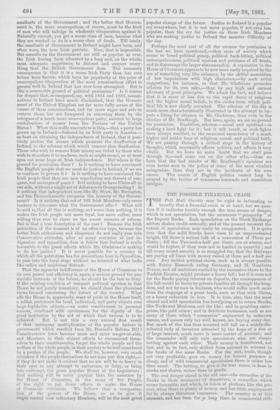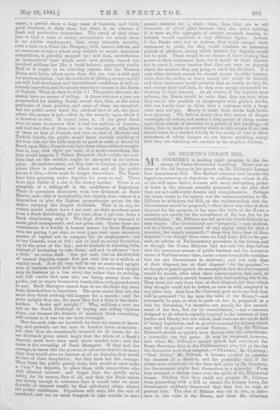THE POSSIBLE FINANCIAL CRASH.
THE Pall Mall Gazette may be right in intimating so broadly that a financial crash is at hand, but we ques- tion if it indicates forcibly enough the true source of danger, which is not speculation, but the enormous " prosperity " of the Deposit Banks. Rash speculation on the Stock Exchange seldom shakes credit seriously, and at the present moment the extent of speculation may easily be exaggerated. It is quite true that the solid Stocks have risen to an unprecedented height, till there is serious talk of a conversion of Three per Cents. ; till the Two-and-a-half per Cents. are at ninety, and would bo higher, if they were not so limited in quantity ; and till every sound security is so struggled for, that the Railways are paying off loans with money raised at three and a half per cent. Any sudden political storm, such as is always possible with Prince Bismarck ruling Germany, and M. Gambetta France, and all ambitions excited by the successive blows to the Turkish Empire, might produce a heavy fall ; but if it were not for the Banks paying interest on deposits, the consequences of the fall would bo borne by private families all through the king- dom, and not by men in business, who would suffer much more from the stoppage of a great trade, such as that with China, or a heavy reduction in iron. It is true, also, that the most absurd and wild speculation has beenvgoing on in rotten Stocks, like Turks and Mexicans, and the like ; and in gambling enter- prises, like gold mines ; and in fictitious businesses, such as are many of those which " companies" engineered by unknown names, and names only too well known, are buying every day. But much of the loss thus incurred will fall on a widely-dis- tributed body of investors attracted by the hope of a rise or of large interest, much more is mere matter of account; and the remainder will only ruin speculators who are simply betting against each other. Their money is transferred, not lost, and is, in fact, only shifted from account to account in the books of the same Banks. For the rest, trade, though not very profitable, goes on, money for honest purposes is cheap, and of wild commercial speculation there is rather less than usual. The betting, to give it its true name, is done in stocks and shares, rather than in goods. The real danger ahead is the old one—the cowardice of the Banks in their treatment of depositors, a cowardice which seems incurable, and which, in times of plethora like the pre- sent, when there is plenty of money, and but little employment for it, always threatens commerce. The country is at this moment, and has been for I:a long time, in commercial still-
water, a period when a large mass of business, and fairly good business, is daily done, but there is an absence of fresh and productive enterprises. The result of that situa- tion is that a mass of money accumulates for which there is no visible employment, that every tolerable security, even a loan to a State like Hungary, with annual deficits, and no resources except a wheat crop subject to severe American competition, is greedily snapped up ; and that, nevertheless, an accumulated fund which must now greatly exceed two hundred millions lies like a bank-balance, apparently sterile. Half of it ought to be relieving regions like the Western States and India, where more than five per cent is still paid for accommodation ; but the methods of shifting money rapidly are still half-developed, and international confidence is still ex- tremely imperfect, and the money remains in masses in the Banks of Deposit. What do they do with it ? The public who own the money have no means of telling. A dozen schemes a year are propounded for making Banks reveal this, that, or the other particular of their position, and some of them are accepted ; but the public never learn the cardinal fact of all, the place where the money is put,—that is, the security upon which it is invested or lent. It cannot learn it. If any great Bank were to state to-morrow that it had ten millions of deposits, and had lent five of them out on the security of bills, three of them on that of Consols and two on that of Mexican and Turkish Stocks, the public would know scarcely anything of the true risk, for the bills may be as good as cash, or drawn by Hawk upon Kite; Consols may have been taken without margin, that is, may sink eight per cent. in a week—something like that would happen, if Prince Bismarck died—while the mil- lions lent on the rubbish might be advanced at its bottom price. As matters stand, not fifty men in London quite know where there is rashness and where not, and all the public knows is this,—there must be danger somewhere. The Banks have been groaning under deposits for years on end. There is no sign visible of a rise in the money market. There is no symptom of a falling-off in the confidence of Depositors. There is querulous discontent with low dividends on Bank Shares, and—this is inexplicable, but exactly true—there is a disposition to give the highest proportionate prices for the shares carrying the largest dividends. That is to say, in- vestors would rather have 4 per cent. on their purchase price from a Bank distributing 20 per cent., than 5 per cent. from a Bank distributing only 8. The high dividend is assumed to mean good management, and not great risk. Under those cir- cumstances, it is hardly in human nature for Bank Managers who are paying 1 per cent. or even per cent. upon enormous masses of capital not to compete for its employment ; not to buy Console, oven at 102; not to lend on sound Securities up to the price of the day ; not to hesitate in rejecting bills, instead of hesitating to take them; and not to advance "just a little " on rotten stuff. One per cent. lost on £5,000,000 of unused deposits, means five per cent. lost on a million of capital stock. It is all very well to say no acute and upright men of business would lend in that way, but acute and upright men do business at a loss every day rather than do nothing, and full vaults fret men who are hiring money from the public, just as empty houses fret leaseholders with ground-rents to pay. Bank Managers cannot bear to see dividend slip away from shareholders to depositors. The more acute they are, the more they think nothing will happen for a month ; and the more upright they are, the more they feel a duty to the share- holders. "Acute and upright I" Why, millions a year are lost on the Stock Exchange in buying and selling Options alone, just because the keenest of mankind think everything will remain as it was for one more fortnight.
How far such risks are incurred, we have no means of know- ing, and probably not ten men in London know accurately ; but that they are occasionally incurred we do know, for we see dividends given which imply that the whole of a Bank's deposits must have been used above market rate ; and the cause is the cowardiy of Bank Managers. If they had the courage, in times like the present, to advertise that for so many days they would give no interest at all on deposits, they would be free of their temptation ; but they have not the courage. They think the public greedy fools, who would at once make a " run " for deposits, to place them with competitors who still allowed interest ; and forget that the public seeks safety for its money, first of all, and that the Bank which was strong enough to announce that it would take no more deposits at interest would, by that self-denial alone, attract the public confidence. Depositors will wait, like the rest of mankind, and are no more tempted to take trouble to save minute interest for a short time, than they aro to sell diamonds or silver plate because they also yield nothing. If it were so, the aggregate of current accounts bearing no interest would represent a very different figure. Indeed, if the Banks were not so jealous, they could compel their customers to yield, for they could combine to announce periods of plethora, during which interest for deposits would not be paid. There would be no chance of their abusing that power to their customers' hurt, for it would be their interest not to exert it, every fraction that they can earn on deposits above the interest they pay going to swell the dividend. It is only when interest cannot be earned except by risky transac- tions that the ability to leave money idle would be desired, and their customers would perceive that as readily as they do, and accept their bad-luck, as they now accept unexpected re- ductions of their interest. At all events, if the deposits, were reduced, the Banks would be safer than they are now, when they are in the position of shopkeepers with glutted stocks, who can hardly bear to think that a customer with a largo order may not pay. Merely to make their books look better is so pleasant. We believe firmly that this source of danger outweighs all others, and makes a long period of cheap money equivalent almost of necessity to a period of bad banking,—of loans, that is made on security which is only secure if no turn should come in a market utterly at the mercy of two or three statesmen, of whose designs no one knows anything, except that they are watching one another in the angriest distrust.



































 Previous page
Previous page